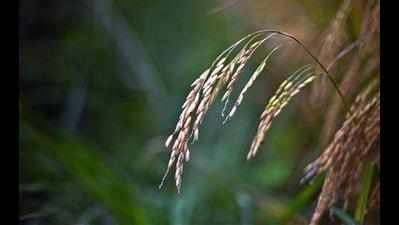- News
- City News
- dehradun News
- BARC team suggests nuclear science for agriculture, water issues
Trending
This story is from December 2, 2016
BARC team suggests nuclear science for agriculture, water issues
A delegation from Bhabha Atomic Centre, headed by its director B S Tomar gave presentations about use of nuclear science for social service, particularly agriculture and allied sectors, at the Himalayan Environmental Studies and Conservation Organisation (HESCO) Centre in Dehradun on Friday.

(Representative image)
DEHRADUN: A delegation from Bhabha Atomic Centre, headed by its director B S Tomar gave presentations about use of nuclear science for social service, particularly agriculture and allied sectors, at the Himalayan Environmental Studies and Conservation Organisation (HESCO) Centre in Dehradun on Friday.
"The delegation talked about the use of gamma radiation in extending the shelf life of food items by significant periods.For instance, the shelf life of litchis can be extended by two months. There is also tremendous use of radiology in the health sector,” said HESCO president Anil Joshi.
The use of isotopes in studying water was also discussed. An isotope study can reveal the origin of water, such as whether it is coming from glaciers or other sources. “It will also indicate the age of the water and the arsenic level in it. Another benefit would be knowing the location of aquifers, and whether they are being recharged. Such studies will thus help in recharging of dry springs, which is quite relevant for Uttarakhand,” Joshi added.
The issue of forest fire, which has been a huge challenge for the state government, was also deliberated. According to Joshi, the scientists talked of coming up with model with which carbon monoxide and oxides in carbon residues in the aftermath of fires will be put to good use in the near future.
In order to contain forest fires, the delegation suggested to create water bodies in chir pine forests in order to create humidity in the soil and in surrounding areas. The moisture will also help in growth of other green plants well as recharge ground water. Both these aspects will reduce dryness in the soil, which will act as deterrent to forest fires.
"The delegation talked about the use of gamma radiation in extending the shelf life of food items by significant periods.For instance, the shelf life of litchis can be extended by two months. There is also tremendous use of radiology in the health sector,” said HESCO president Anil Joshi.
The use of isotopes in studying water was also discussed. An isotope study can reveal the origin of water, such as whether it is coming from glaciers or other sources. “It will also indicate the age of the water and the arsenic level in it. Another benefit would be knowing the location of aquifers, and whether they are being recharged. Such studies will thus help in recharging of dry springs, which is quite relevant for Uttarakhand,” Joshi added.
The issue of forest fire, which has been a huge challenge for the state government, was also deliberated. According to Joshi, the scientists talked of coming up with model with which carbon monoxide and oxides in carbon residues in the aftermath of fires will be put to good use in the near future.
In order to contain forest fires, the delegation suggested to create water bodies in chir pine forests in order to create humidity in the soil and in surrounding areas. The moisture will also help in growth of other green plants well as recharge ground water. Both these aspects will reduce dryness in the soil, which will act as deterrent to forest fires.
End of Article
FOLLOW US ON SOCIAL MEDIA










